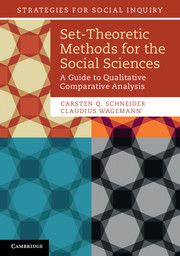Book contents
- Frontmatter
- Contents
- Figures
- Tables
- Acknowledgements
- Introduction
- Part I Set-theoretic methods: the basics
- 1 Sets, set membership, and calibration
- 2 Notions and operations in set theory
- 3 Set relations
- 4 Truth tables
- Part II Neat formal logic meets noisy social science data
- Part III Potential pitfalls and suggestions for solutions
- Part IV Variants of QCA as a technique meet QCA as an approach
- Glossary
- Bibliography
- Index
3 - Set relations
Published online by Cambridge University Press: 05 November 2012
- Frontmatter
- Contents
- Figures
- Tables
- Acknowledgements
- Introduction
- Part I Set-theoretic methods: the basics
- 1 Sets, set membership, and calibration
- 2 Notions and operations in set theory
- 3 Set relations
- 4 Truth tables
- Part II Neat formal logic meets noisy social science data
- Part III Potential pitfalls and suggestions for solutions
- Part IV Variants of QCA as a technique meet QCA as an approach
- Glossary
- Bibliography
- Index
Summary
Sufficient conditions
Crisp sets
Basic logic of sufficiency
Given some plausible theoretical arguments, a condition can be considered sufficient if, whenever it is present across cases, the outcome is also present in these cases. In other words, there should not be a single case that shows the condition but not the outcome. Say, for example, we claim that being a Western European country (X) is a sufficient condition for being a democracy (the outcome Y). If this claim is true, all countries in Western Europe would also have to be democracies; no Western European country can be a non-democracy. As shown in section 2.5, this can be expressed as follows:
X → Y.
This statement should be read: “if X, then Y,” or “X implies Y,” or “X is a subset of Y.” Based on this statement, what do we know about the value of Y in cases that do not show a positive value for X? Asked another way, what expectations about the outcome value do we have for countries that are not located in Western Europe (~X)? Does our claim that X is sufficient for Y automatically mean that ~X implies ~Y? The answer is no! But why?
The statement that X is sufficient for Y generates expectations on the value of Y only for cases that display X. All cases that are not members of X are not relevant for the statement of sufficiency. That is to say, they neither help to verify nor falsify our claim, independently of whatever value of Y these cases might display. While counterintuitive at first sight – especially for anybody with thorough training in correlational methods – the statement “if X, then Y” creates expectations for values on Y only when X is present. It does not generate any such expectation, or any expectation at all, in cases where ~X is present. It follows that countries in places other than Western Europe (~X) can be stable democracies (Y) or not stable democracies (~Y) – and indeed there are plenty of both types – neither of which confirms or contradicts the statement that X is sufficient for Y.
- Type
- Chapter
- Information
- Set-Theoretic Methods for the Social SciencesA Guide to Qualitative Comparative Analysis, pp. 56 - 90Publisher: Cambridge University PressPrint publication year: 2012



